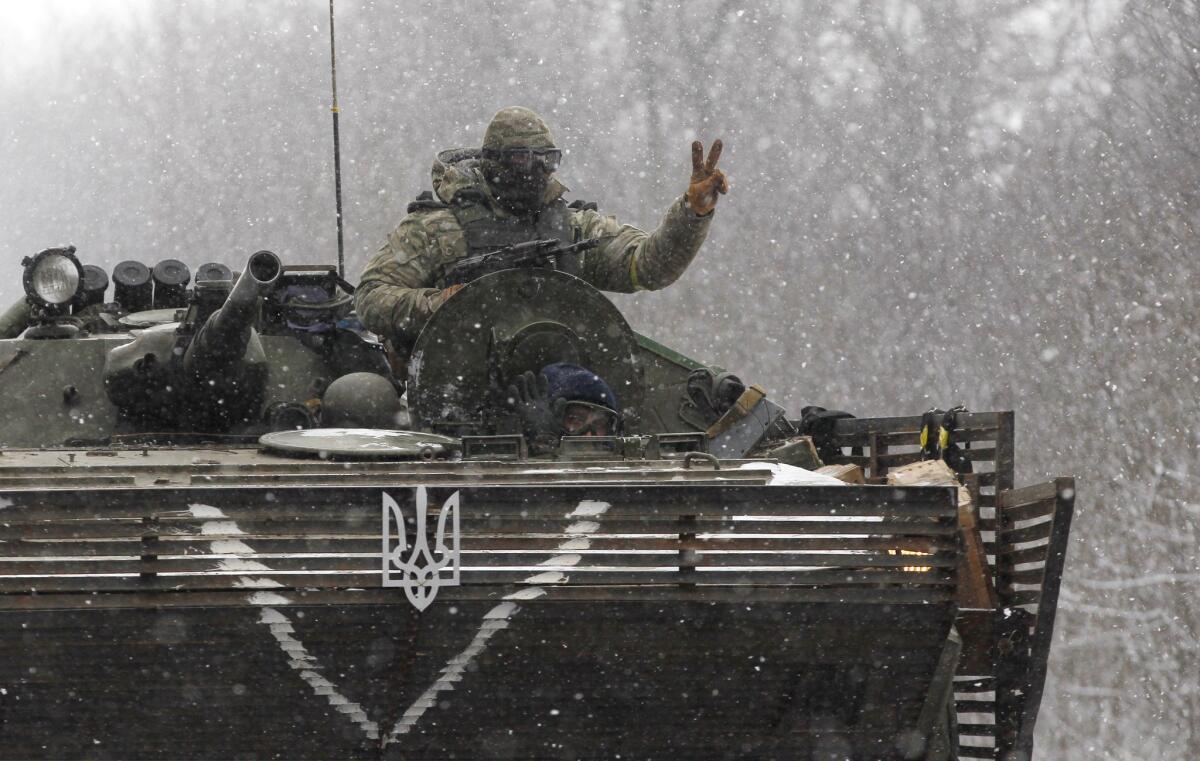Fighting continues at Ukraine rail hub despite cease-fire

- Share via
Ukraine accused pro-Russia separatists of launching 112 attacks on government positions during the first day of a cease-fire as both sides cast doubt on their likelihood to comply with the next stage of the peace plan -- withdrawing heavy weaponry from the war zone.
Fighting was most intense around the Debaltseve rail junction where the government and separatists have been battling for control for weeks. Five Ukrainian soldiers were killed and 25 were injured, Col. Andriy Lysenko of the Ukrainian National Security and Defense Council told reporters in Kiev.
The Ukrainian and Russian presidents agreed at peace talks in the Belarus capital of Minsk last week that all hostilities would cease as of Sunday and the two warring factions would begin pulling back heavy weaponry from the front lines Tuesday.
“Fulfillment of the first provision of the Minsk agreements is mandatory for the pullout of heavy weapons from the line of contact. One hundred and twelve attacks are not an indicator of a cease-fire,” Lysenko said. “At the moment we are not ready to withdraw heavy weapons.”
Separatist military leader Eduard Basurin also signaled that the Russian proxies would withdraw their artillery only if they see Ukrainian troops complying with the next step of the Minsk agreement.
“We will begin pulling back equipment from the line of contact if we receive a certain signal, which is if the Ukrainians also do the same thing,” Basurin was quoted as saying by Russia’s Interfax news agency.
The rail hub at Debaltseve, which the insurgents want to control so they can shuttle supplies and fighters between their strongholds in the eastern regions of Donetsk and Luhansk, is reportedly surrounded by separatist gunmen.
The encircled government troops, which some reports number as high as 7,000, were offered safe passage out of rebel-held territory in exchange for surrendering their weapons, separatist officials told reporters in Donetsk. There was no immediate reply by the government, which made clear its intent to hold on to Debaltseve when it deployed thousands of newly recruited troops to the area last month.
A monitoring mission of the Organization for Security and Cooperation in Europe, which has been patrolling eastern Ukraine since April, was blocked by separatist gunmen from entering Debaltseve on Sunday, the Vienna-based organization reported Monday.
German Chancellor Angela Merkel and French President Francois Hollande, who brokered the cease-fire during a 16-hour negotiating marathon last week, spoke by telephone late Monday with Ukrainian President Petro Poroshenko to discuss concerns about the continued fighting over Debaltseve.
Hollande and Merkel “expressed the wish that the OSCE observers have a free access to continue their work on the ground,” a French official told the Associated Press.
Meanwhile in Brussels, the European Union disclosed the names of 19 Russian and separatist leaders and nine organizations that have been added to its sanctions list in punishment for supporting the territorial incursions in Ukraine.
The move brought to 151 the number of people to be denied visas and subjected to having their assets frozen for their roles in the Ukraine violence. Thirty-seven entities -- businesses and pro-separatist organizations -- are also now on the European blacklist.
The first EU sanctions were imposed after Russia sent paratroopers to Ukraine’s Crimea peninsula a year ago to take control of the militarily strategic territory, a move widely denounced as an illegal change of national boundaries by force.
Russian officials belittled the sanctions as “illegitimate” and “senseless,” and accounts by the official Tass news agency said the global total of Russians targeted by sanctions is 420, including those affected by actions by the EU, the United States, Canada, Australia, Switzerland and Norway.
Russia’s European Union envoy, Vladimir Chizhov, told Tass that the sanctions are an attempt by the United States to steer European allies away from trade with Russia so that U.S. businesses can capture that volume.
“Our trade with the EU traditionally exceeded trade volumes with the U.S. 11-12 times and in the best years our trade hit a billion euros a day,” Chizhov said. “The preliminary results of 2014 show that our trade with the EU fell by 10-11%.”
Russian President Vladimir Putin and his Kremlin colleagues have cast the Ukraine conflict as a response to U.S. incursion into Russia’s tradition sphere of influence in the former Soviet region. Fighting in eastern Ukraine was triggered by the Russian takeover of Crimea, and Kiev and its allies have accused the Kremlin of instigating the violence to destabilize the region after a pro-European government came to power last year.
Denis Pushilin and Vladislav Deynego, top officials of the separatists’ self-proclaimed people’s republics of Donetsk and Luhansk, respectively, warned Kiev against joining any Western alliance, threatening to scrap the Minsk accords if Ukraine takes steps toward the North Atlantic Treaty Organization.
“Any move by Kiev toward NATO or any other anti-Russia military alliance is unacceptable for us,” Pushilin and Deynego said in a joint statement posted on a separatist website. “In that case we will immediately cut all the interaction with Kiev and consider the Minsk accords null and void.”
Special correspondent Victoria Butenko in Kiev contributed to this report.
Follow @cjwilliamslat for the latest international news 24/7
More to Read
Sign up for Essential California
The most important California stories and recommendations in your inbox every morning.
You may occasionally receive promotional content from the Los Angeles Times.







